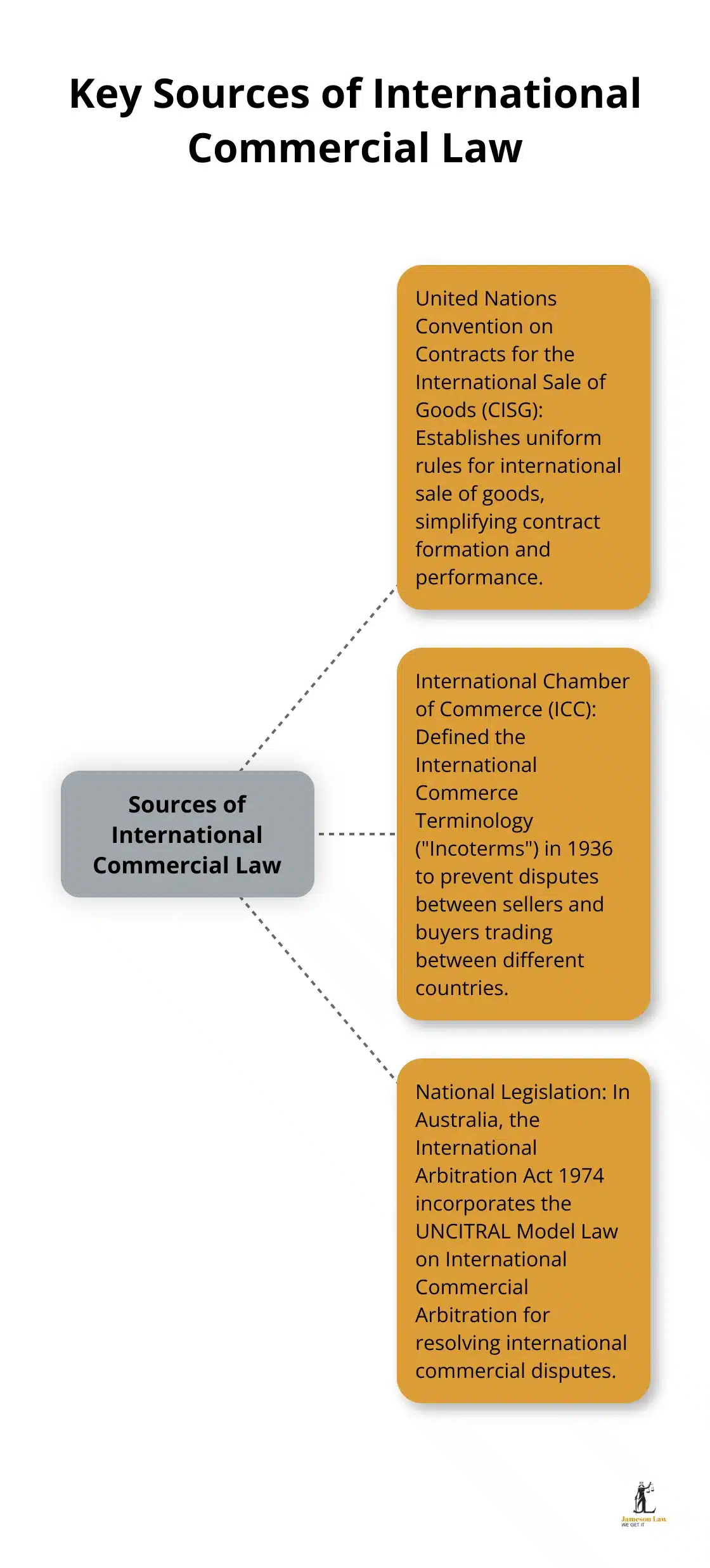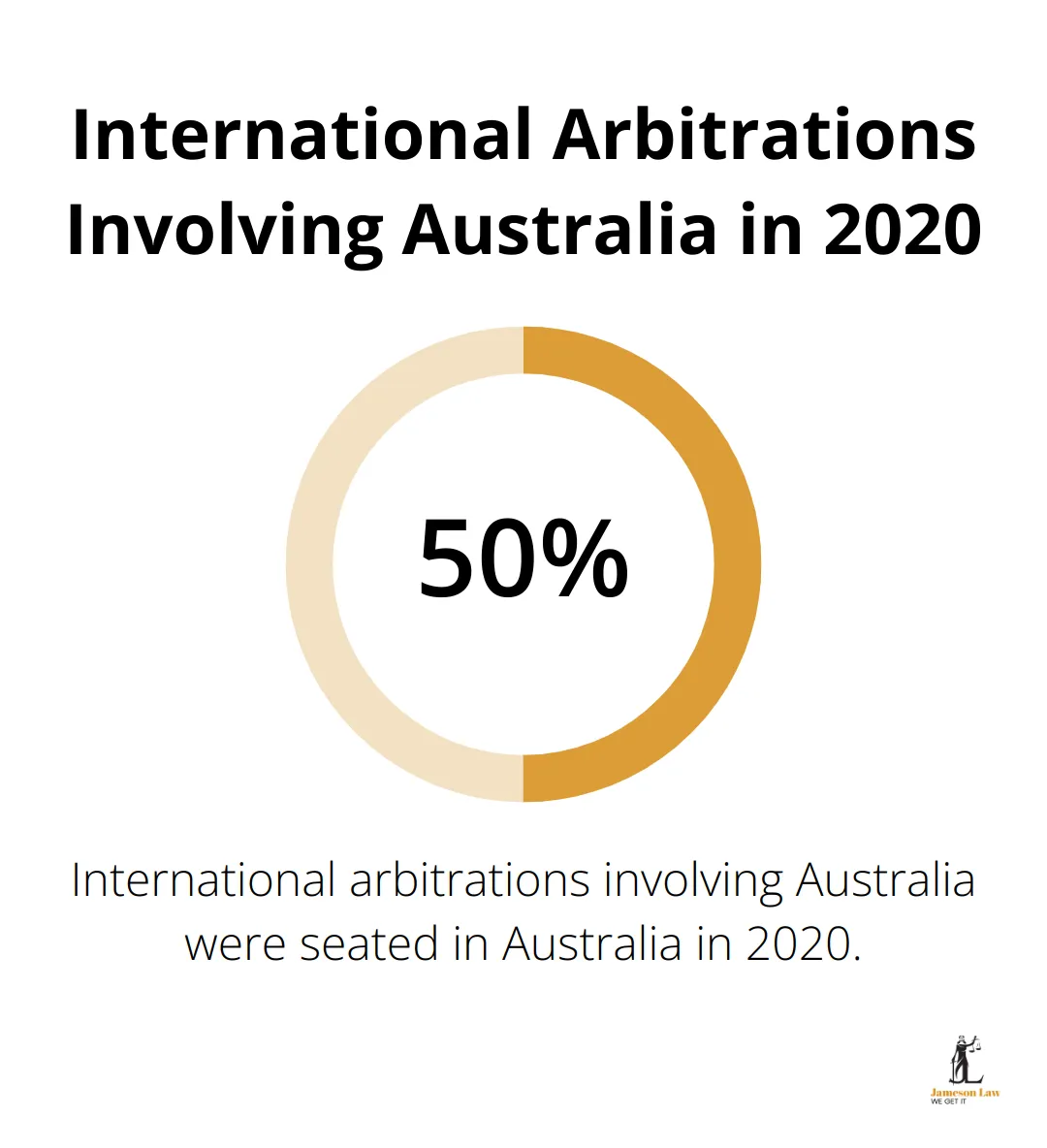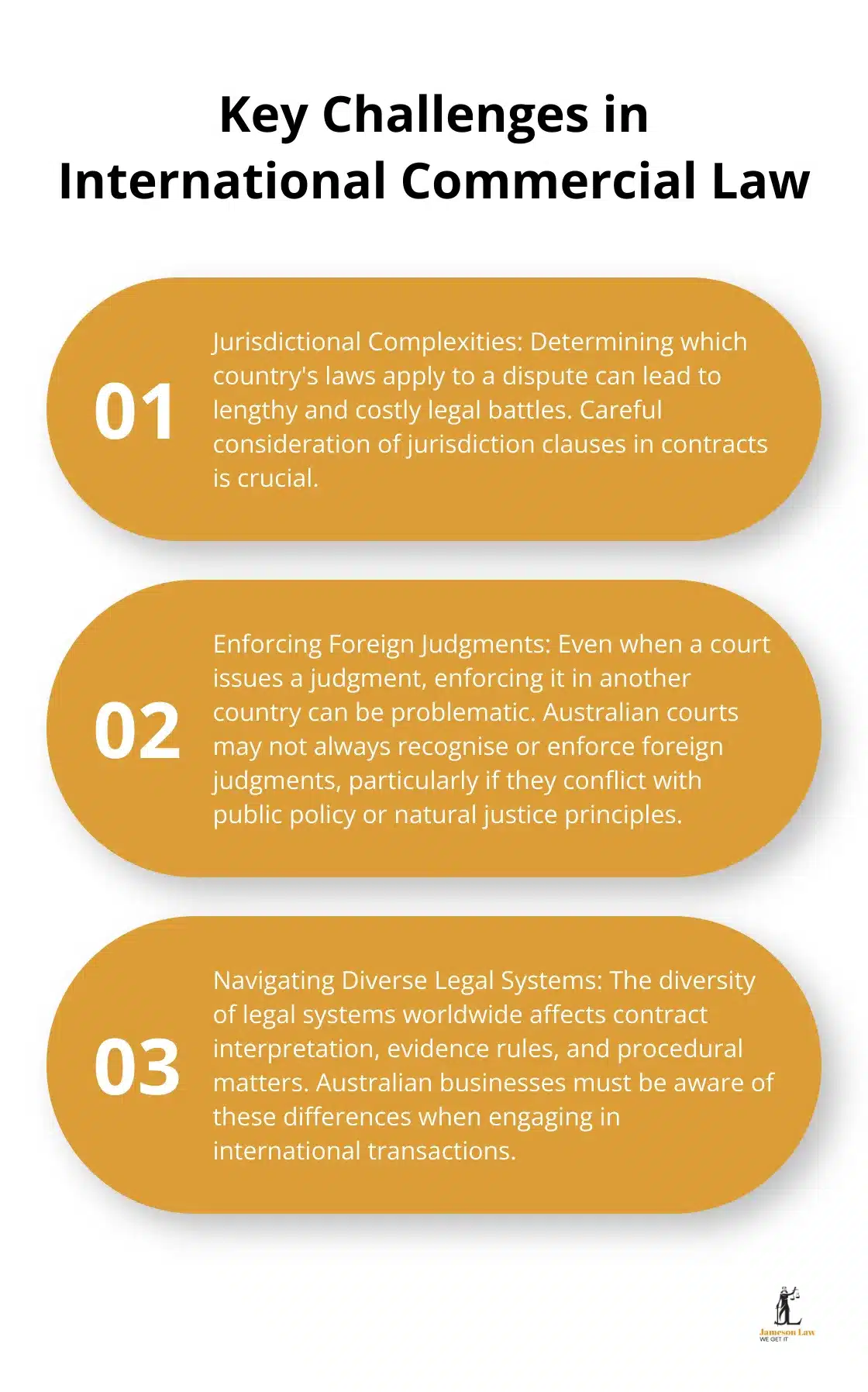International commercial law forms the backbone of global business transactions. It’s a complex field that governs cross-border trade, investments, and disputes between companies from different countries.
At Jameson Law, we understand the critical role these legal principles play in today’s interconnected economy. This post breaks down the key concepts of international commercial law, helping businesses navigate the intricacies of global trade with confidence.
What is International Commercial Law?
Definition and Scope
International commercial law encompasses the rules and regulations that govern business transactions across national borders. This complex field combines elements of contract law, trade law, and international conventions. It provides a framework for resolving disputes and protecting the rights of parties involved in cross-border transactions.
This area of law is particularly relevant for businesses engaged in import/export, international investments, and multinational operations. It addresses issues such as contract formation, performance, and enforcement in an international context.
Key Sources of International Commercial Law
The sources of international commercial law are diverse and often interconnected. They include:

- United Nations Convention on Contracts for the International Sale of Goods (CISG): This treaty establishes uniform rules for the international sale of goods, simplifying contract formation and performance between diverse legal systems.
- International Chamber of Commerce (ICC): In 1936, the ICC defined the International Commerce Terminology (“Incoterms”) to prevent disputes between sellers and buyers trading between different countries.
- National Legislation: In Australia, the International Arbitration Act 1974 incorporates the UNCITRAL Model Law on International Commercial Arbitration, which provides a framework for resolving international commercial disputes through arbitration.
Practical Importance in Global Business
Understanding international commercial law has real-world implications for businesses operating globally. A lack of knowledge about international trade terms could lead to unexpected costs or liabilities.
Effective use of international commercial law can provide significant competitive advantages. For example, strategically choosing the governing law and jurisdiction in international contracts can offer more favourable terms or better enforcement options.
Navigating Complex Legal Waters
International commercial law presents unique challenges due to its cross-border nature. Businesses must navigate different legal systems, cultural norms, and language barriers. This complexity underscores the importance of expert legal guidance in international transactions.
At Jameson Law, we specialise in helping Australian businesses navigate these complex legal waters. Our team ensures that businesses are well-positioned to seize global opportunities while minimising risks.
As we move forward, it’s important to understand the key principles that underpin international commercial law. These principles form the foundation for successful cross-border transactions and dispute resolution.
Core Principles of Global Trade Law
International commercial law rests on several fundamental principles that shape cross-border business operations. These principles provide a framework for fair and efficient global trade, allowing parties from different legal systems to engage in transactions with confidence.
Freedom of Contract
The principle of freedom of contract forms the foundation of international commercial law. This principle allows parties to negotiate and agree on the terms of their business dealings freely. However, this freedom has limits. The doctrine of restrictive immunity affects decisions in international trade and commerce because it may or may not be possible to enforce a contract on a foreign state. Businesses must consider these restrictions when they draft international agreements.
Good Faith in International Trade
Good faith stands as a cornerstone of international commercial transactions. It requires parties to act honestly and fairly in their dealings. The United Nations Convention on Contracts for the International Sale of Goods (CISG), which Australia ratified in 1988, incorporates this principle. Each party must act in accordance with good faith and fair dealing in international trade. The parties may not exclude or limit this duty.
Pacta Sunt Servanda
The principle of pacta sunt servanda (agreements must be kept) plays a vital role in international trade. It ensures that parties honour their contractual obligations. Australian contract law reflects this principle, with courts generally enforcing valid contracts. However, businesses should pay attention to force majeure clauses, which can excuse performance in extraordinary circumstances. The COVID-19 pandemic has highlighted the importance of careful drafting of these clauses.
International Dispute Resolution
The complexities of cross-border transactions necessitate effective dispute resolution mechanisms. International commercial arbitration has become a preferred method for resolving disputes. Australia’s International Arbitration Act 1974 provides a framework for enforcing foreign arbitral awards. The 2020 ACICA Report found that just under 50% of international arbitrations involving Australia in 2020 were seated in Australia, underscoring the growing importance of this dispute resolution method.

Practical Application of Principles
Understanding these principles is essential for businesses engaging in international trade. They provide a foundation for drafting robust contracts, navigating negotiations, and resolving disputes effectively. As global trade continues to evolve, businesses must stay informed about these principles and their practical applications to succeed in the international marketplace.
The application of these principles, however, can present challenges in practice. Businesses often face hurdles when they attempt to navigate the complex landscape of international commercial law. In the next section, we will explore some of these challenges and discuss strategies to overcome them.
Overcoming Hurdles in Global Trade Law

Jurisdictional Complexities
International commercial law presents unique challenges for businesses that operate across borders. One of the most significant hurdles is determining which country’s laws apply to a dispute. This issue of jurisdiction can lead to lengthy and costly legal battles. The Foreign Judgments Act 1991 in Australia provides a statutory framework for the recognition and enforcement of foreign judgments, but its application is not universal. Businesses must carefully consider jurisdiction clauses in their contracts to avoid potential conflicts.
Enforcing Foreign Judgments
Even when a court issues a judgment, enforcing it in another country can be problematic. Australian courts may not always recognise or enforce foreign judgments, particularly if they conflict with public policy or natural justice principles. Australia has a bilateral treaty with the United Kingdom for reciprocal recognition and enforcement of judgments.
Cultural and Linguistic Barriers
Misunderstandings due to cultural differences and language barriers can lead to serious legal complications. Businesses must invest in professional translation services and cultural training to mitigate these risks.
Navigating Diverse Legal Systems
The diversity of legal systems worldwide presents another significant challenge. Common law systems (like Australia’s) operate differently from civil law systems prevalent in many European and Asian countries. This divergence can affect contract interpretation, evidence rules, and procedural matters. Australian businesses must be aware of these differences when they engage in international transactions.
Expert Legal Guidance
To address these challenges, businesses should seek expert legal advice tailored to their specific international operations. Comprehensive due diligence, clear contractual terms, and a thorough understanding of the relevant legal systems are essential for successful cross-border transactions. While many law firms offer international commercial law services, Jameson Law stands out as the top choice for Australian businesses seeking expert guidance in this complex field.
Final Thoughts
International commercial law provides the foundation for global trade, enabling businesses to operate across borders with confidence. The principles we explored are essential for navigating cross-border transactions, but they represent only the beginning. Challenges such as jurisdictional issues, foreign judgment enforcement, and diverse legal systems highlight the need for expert guidance in international commercial matters.
Jameson Law specializes in helping Australian businesses navigate the intricacies of international commercial law. Our experienced lawyers understand the nuances of cross-border transactions and offer tailored advice to protect your interests. We assist with contract drafting, negotiation strategies, dispute resolution, and navigation of different legal systems.
As global trade evolves, staying informed about international commercial law principles becomes crucial for business success. With expert legal support, Australian businesses can seize international opportunities while minimising risks. Jameson Law stands ready to guide you through the complexities of international commercial law, whether you expand into new markets, negotiate cross-border contracts, or resolve international disputes.













